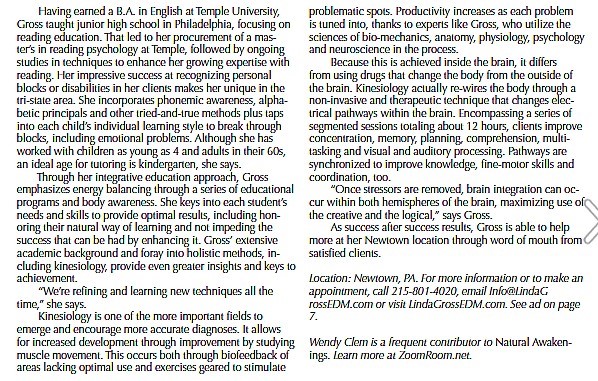She does not identify such Adrenal Exhaustion as a warning sign. "Instead, she says, "it is the result of a gradual condition. People go to bed tired, wake tired, can't sleep and have lack of enjoyment overall. And in extreme situations, a chronic condition results because the body begins to break down."
Dr. James Lewerenz, of Longevity Health Institute and Lewerenz Medical Center in Rochester Hills and Madison Heights, adds that a typical Adrenal Fatigue patient encounters a long-lasting stressful event — from months' to years' worth. It's a matter of “wired and tired,” in a cycle of never-ending, extreme exhaustion. Cortisol, one of the stress hormones produced by the adrenals, is imperative in survival during a “Flight or Fight” response. But, bursts of it are not meant to be sustained for long periods of time.
“You can almost see this developing, as it unfolds,” Lewerenz said. “The old saying, 'What goes up, must come down' is the same for your adrenals. Too much stress without the balance of recovery — sleep, good nutrition, spiritual harmony — eventually leads to a burnout, or Adrenal Fatigue, caused by too low of a cortisol response.”
He adds that what occurs is the body's equivalent of screaming, “Time out! You are killing us!” Typical related fatigue can include low energy, brain fog, dizziness or lightheadedness, sensitivity to light, low blood pressure, cravings for salt or sugar and general over-sensitivity to most stimuli.
A patient of Dr. Cutler's describes additional symptoms as becoming lightheaded when standing up or taking showers, shaking hands and blurred vision, nausea, inflammation, joint pain and extreme fatigue. "It was caused by her constant cortisol production," he explains, "that took away from other hormones in a condition called pregnenolone steal. That creates another set of health issues."
Certified Nutritional Counselor Lee Rossano, of Lake Orion's Advanced Nutritional Solutions, has found that Adrenal Fatigue is becoming more common, with many physicians ignoring the adrenals.
"As a result," she says, "it is not generally treated until in the final stages of failure, such as with the emergence of Addison's Disease. Patients arrive feeling overwhelmed by their lives and edgy, irritable, depressed or anxious, unaware that the adrenals are the culprit. Possible root causes could include viruses, out-of-balance sex hormones and diets high in processed foods."
“Clients can barely open their eyes in the morning," says Rossano, and simple tasks like going to the grocery store feel overwhelming, and they find themselves operating in panic mode most of their days. It is difficult for them to function in their everyday lives and jobs, not to mention taking care of a family. Society is moving away from a relaxing life and many people have minimal down-time. When they do relax, they spend it on their phones or social media looking at other people’s lives. When we begin to move away from taking care of ourselves, we lose the ability to handle stress, and we then walk ourselves right into adrenal fatigue.”
Catherine Waller, M.D., of Waller Wellness Center in Rochester Hills, most frequently treats adrenal stress and adrenal fatigue, with the former ironically characterized by an over-production of cortisol. "That," she says, "is a typical response to health conditions such as psychological stress, inadequate/interrupted sleep, blood sugar dysregulation, inflammation, pain, anxiety, over-scheduled lives, toxic exposures, overuse of stimulants, thyroid problems, nutritional deficiencies and more."
“Over-production of cortisol can promote further problems as conditions progress to advanced and profound adrenal fatigue, which then produces too little cortisol,” adds Waller.
Following diagnosis, effective medication is important, concur our experts.
I was always so driven and motivated until one day I wasn’t. Getting out of bed felt like my greatest task of the day and I wondered if I would ever have my drive and energy back. Until I healed my adrenals, no amount of coffee or caffeine would provide the energy I was used to. I began to implement relaxing activities into my nighttime routine, started eating a whole foods diet and taking my personalized supplement plan. I finally felt like myself again and couldn’t wait to get back to my to-do list and conquer each day! I will continue to live this lifestyle, realizing if my adrenals aren’t happy, I’m not happy!
~From a patient of Lee Rossano's
I was always energetic, but after donating blood in December, 2005, noticed a severe change. I couldn't get out of bed for three months. I was so weak and tired, was becoming intolerant of people and angry all the time. After doing some research, I was tested and learned I had adrenal fatigue. After I started taking the prescribed supplements I felt better right away. I enjoy my life, because I’m not so wound up anymore. I can relax and breathe.
~47 year-old Annette T., a patient of Dr. Waller's
Linda Gross (Kinesiology)



This article was first published in September 2016 in Natural Awakenings of Mercer County, NJ
